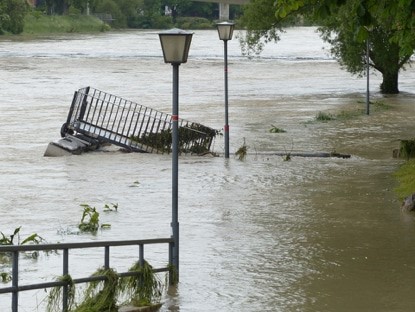
The summer of 2016 kicked off with heavy rainfall that caused major flooding. Many cities in* Europe saw housing and streets flooded, while debris lingered for long thereafter*. The areas mostly affected were Germany and France, but also Austria, Belgium, Romania, Moldova, the Netherlands and the United Kingdom. A number of cities in these regions were faced the emotionally and economically drowning effects of floods. Areas such as the German states of Bavaria, Hesse, Rhineland-Palatinate, Baden-Württemberg, and North Rhine-Westphalia all suffered the harsh consequences that severe floods bring along. At their source, rivers Neckar, the Danube, Rhine and Seine displayed excessively high levels of water which carried the flood on to their branches and along their banks.
Socio-economic Impacts of floods
It goes without saying that flooding can result in damage of possessions and harvest but also bring about infectious diseases and even worse, the loss of human life. Moreover, any kind of economic activity may come to a halt because of disruption and possible damage to infrastructure and transportation networks such as roads and bridges. In many cases residents are forced to flee from their homes and their everyday lives to be spared of the aftermath following the floods.
Consequently, damage to industry can cause the loss of livelihoods; not only at a financial level but at the level of bare necessities. This type of damage can result in long-term impacts such as limited supplies of clean water, wastewater treatment, loss of electricity, transport and communication and limited health care supplies.
Psychological Impact of floods
Floods do not only damage property – they damage lives. The psychological impact that follows exposure to natural disasters such as floods results in a range of different symptoms. The loss of loved ones has deep impact, especially on children. Displacement from one’s home, loss of property and disruption to business and social affairs can cause continuing stress. For some people the psychological impacts can be long lasting.
According to a study conducted by the Department of Psychological Sciences of the University of Worcester (written by Mason V, Andrews H. and Upton D) individuals who have experienced a flood can display symptoms of post-traumatic stress disorder (PTSD), depression and anxiety.
Most frequently the people who took part in the study reported *“coping strategies were rational, detached and avoidant, with the least frequent being emotional coping. Having to vacate home following flood, previous experience of flooding and poor health were associated with greater psychological distress. Detached coping appeared to be related to less distress”. *
Standing up to the disastrous effects of floods
The overall objective of FLOOD-serv is to offer a pro-active and personalized public service application that will encourage the involvement of the citizens in risk reduction actions through the collaborative power of ICT networks.
In order to fight floods and their catastrophic effects* local communities need to become stronger and empowered*. With the utilization of new technologies (e.g. social media and mobile technologies) citizens can become more aware regarding flood risks and take part in the design of emergency services that deal with disaster management actions against floods.
Of course, the development and implementation of risk reduction actions requires the cooperation of many different sectors. The government, private sector, NGOs and other civil society organizations as well as citizens will need to work together in order to measure the potential impact of floods, warn the citizens and prepare the recovery plan for such events.
The FLOOD-serv project aims to offer an effective opportunity for collective problem solving, knowledge sharing, social exchange and community-wide participation at local and global scale. This will help gain insights and ensure that local communities are prepared and have developed solid risk reduction solutions.
In order to aid communities in their efforts to overcome the disastrous effects of floods the project partners will create and test the flood awareness and resilience techniques in five pilot areas: Slovakia, Genoa Municipality, Bilbao, Vila Nova de Famalicão and Tulcea.
Conclusion
It is of utter importance to create communities resilient to hazards by preparing for these threats and enhancing the ability of these communities to absorb impacts and keep evolving. Preparedness will reduce the negative impacts of hazards and save lives that would be otherwise lost in disasters. It will also secure the economic stability of these communities, and support the health of our coastal ecosystems, including wetlands which are essential for reducing storm impacts on coastal communities.
